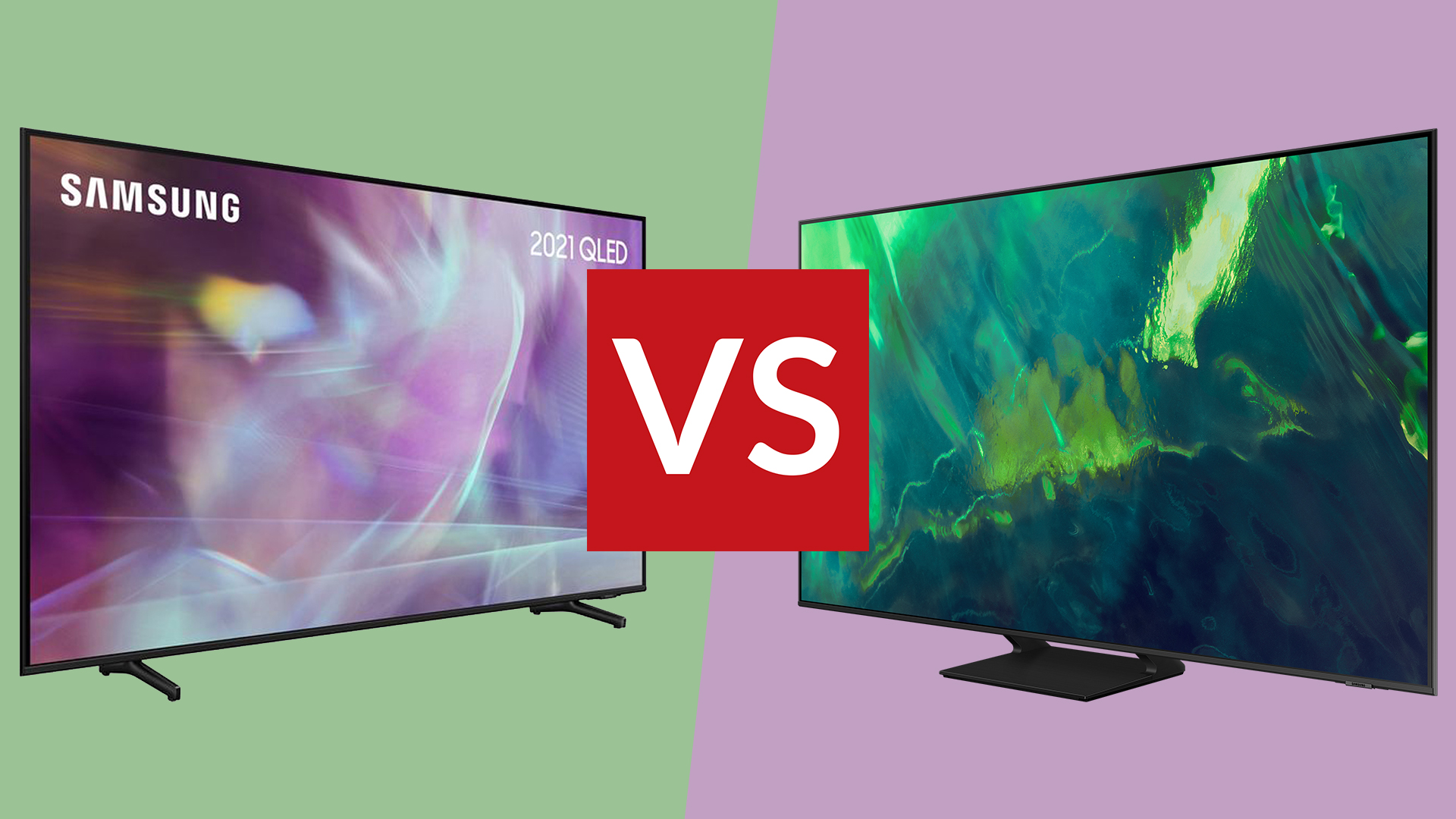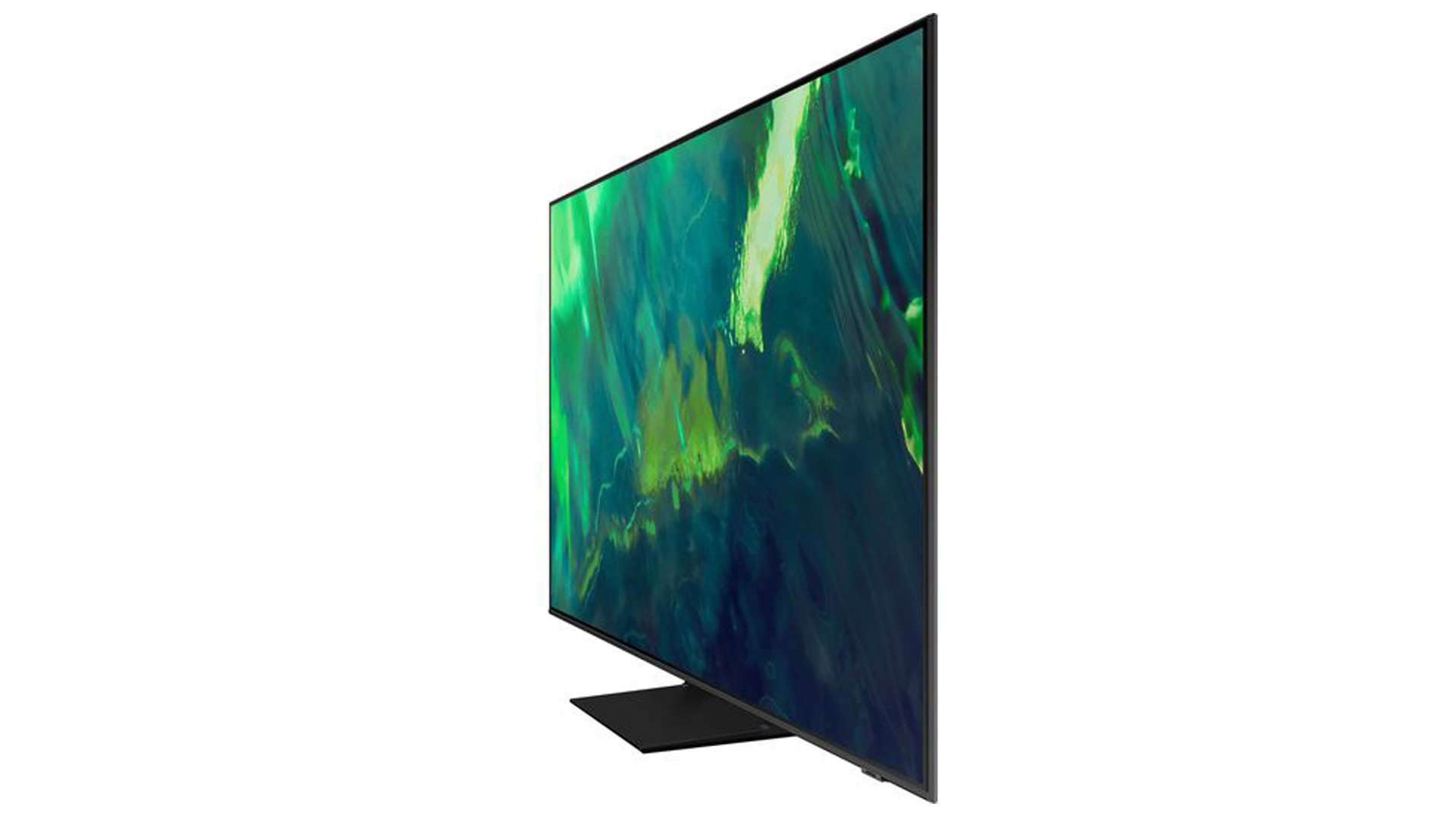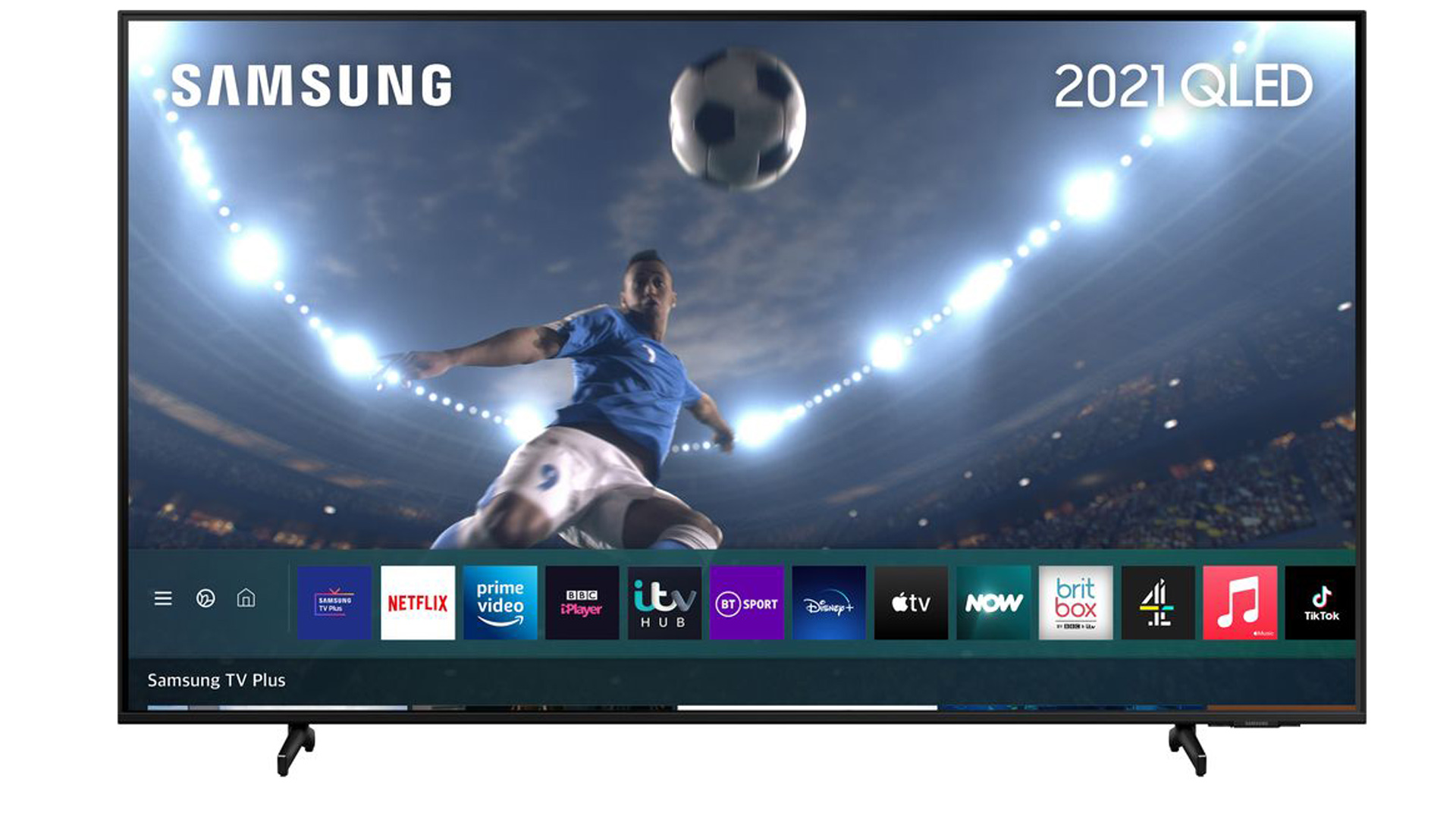
Get all the latest news, reviews, deals and buying guides on gorgeous tech, home and active products from the T3 experts
You are now subscribed
Your newsletter sign-up was successful
If you want a 2021 Samsung QLED that won’t break the bank, the entry-level Q60A and its Q70A sibling are obvious front runners. Both are fashionably thin, with some fancy sounding tech on board, but which should you choose?
If small is beautiful, then the Q60A seals the deal early. The Q60A is available in a multiplicity of screen variations, starting at a bijou 43-inches, which looks set to be one of the best TVs under £1000 and best TVs under $1000 of the year.
The Q70A opens at 55-inches, so you might have trouble wedging it in that alcove. But maybe it’s worth rearranging the furniture, since the Q70A boasts better connectivity than the Q60A and, significantly, far more AI processing talent. Let’s dig a little deeper…
Samsung Q60A vs Q70A: Price & screen sizes
There’s an appreciable price premium for the Samsung Q70A over the Q60A.
The Q60A is available in 43-, 50-, 55-, 65-, 75- and 85-inch screen sizes (QE43Q60A, QE50Q60A, QE55Q60A, QE65Q60A, QE75Q60A, QE85Q60A), priced at £749, £899, £999, £1,299, £1,799 and £2,799 respectively. Browse our Samsung discount codes to bag a saving on your order.
In the US, the Q60A range is available in 43-, 50-, 55-, 60-, 65-, 70-, 75- and 85-inch screen sizes (QN43Q60A, QN50Q60A, QN55Q60A, QN60Q60A, QN65Q60A, QN70Q60A, QN75Q60A, QN85Q60A). These have official prices of $599, $699, $849, US$999, $1,099, $1,349, $1,499, $2,799 respectively.
In Australia, the Q60A comes in 55-, 65-, 75- and 85-inch screen sizes (QA55Q60A QA65Q60A, QA75Q60A, QA85Q60A), priced AU$1,374, AU$1,799, AU$2,399, AU$3,699.
Get all the latest news, reviews, deals and buying guides on gorgeous tech, home and active products from the T3 experts
In the UK, the Q70A starts at 55-inches, and follows through with 65-, 75- and 85-inch models (QE55Q70A, QE65Q70A, QE75Q70A, QE85Q70A). These sell for £1,199, £1,499, £2,399, and TBA).
In the US, the 55-, 65-, 75- and 85-inch Q70A retail for $1,099, $1,399, $2,299 and $2,999 respectively.
In Australia, the Q70A comes in 55-, 65-, 76- and 85-inch screen sizes (QA55Q70A, QA65Q70A, QA75Q70A, QA85Q70A), priced at AU$1,799, AU$2,299, AUS$3,149, and AUS$5,249 respectively.

Samsung Q60A vs Q70A: Design & connectivity
Samsung has done a nice styling job on the Q60A and Q70A. Both flatscreens adopt a minimalist 25cm thin ‘AirSlim’ design, with stylish three-sided micro bezel. It’s the stand style that sets the models apart.
The Q60A has two individual feet, which will require wide AV furniture if you’re not wall-mounting. These are height adjustable, to accommodate adding one of the best soundbars without obscuring the screen.
The Q70A has a simple central pedestal stand, which makes it simpler in terms of furniture.
The Q60A features three HDMI inputs, with eARC. These are all HDMI 2.0, which is fine for 4K HDR overall, but means you won't be able to run your PS5 or Xbox Series X at 4K 120Hz, if you're a gamer who cares about such things. The Q60A does support ALLM (Auto Low Latency Mode) though, so will switch to a low input lag gaming mode when you power up your console.
The Q70A comes with a more accommodating set of four HDMI ports. One of these is HDMI 2.1 and supports 4K 120Hz. There’s also ALLM and AMD FreeSync VRR on board. This definitely signals the Q70A as the screen to go for if you’re a gamer of the two, especially for next-gen.
Both the Q60A and Q70A also come with Samsung’s new slim One Remote control, powered by solar recharging (including from indoor lighting), so no more AAA batteries to worry about. This has a built-in microphone for voice interaction with Google Assistant, Amazon Alexa and Samsung’s own Bixby interface.
Samsung Q60A vs Q70A: Picture and sound quality
Both the Q60A and Q70A feature the same Dual LED backlight system, designed to improve contrast performance, and quantum dot (QLED) colour filter for extreme colour fidelity. They both lack local dimming used in Samsung's higher-end sets, a limitation which will impact contrast and HDR precision and intensity.
However, while there's lots that the same, there’s a significant difference in the picture engines employed.
The Q60A features Samsung’s Crystal Processor 4K, while the Q70A uses the more advanced Quantum Processor 4K, powered by AI machine learning. For fine picture detail, upscaling, and better gradations in colour (making it look more natural), the latter will win ever time.
HDR support is the same on both models. There’s compatibility with HDR10, HDR10+ and HLG, but true to form, no love shown for Dolby Vision, which remains disappointing.
Audio performance is inevitably limited by the driver setup and lack of space in the AirSlim cabinet, however Samsung has some tricks up its sleeve in the form of OTS (Object Tracking Sound).
Both the Q60A and Q70A use 'OTS Lite'. This employs digital processing to give the impression that the screen’s audio system is actually coming forward from the panel rather than down-firing, creating a faux 3D audio effect.
The Q60A features an iteration of the brand’s Q-Symphony system, Q-Symphony Lite, which allows the TV sound system to be used in conjunction with a compatible Samsung Q-Symphony soundbar.
The Q70A does much the same, but drops the Lite suffix. So let’s assume it sounds a little deeper and more true to life when combined with a compatible soundbar.
The Q70A also has SpaceFit, a room calibration system designed to tune the set’s audio output to your living room, and AVA (Active Voice Amplifier) technology. This dynamically adjusts the dialogue level in content to compensate for noises detected in your own living room environment.
Neither screen fully works with Dolby Atmos, but can use HDMI eARC to pass Dolby Atmos from streaming apps through to a compatible soundbar or home cinema system. There’s no support for DTS:X. This isn’t an issue with streaming apps, as the sound format isn’t used by these services, but if you were planning to hook up a Blu-ray player, DTS:X audio will not be passed through to a sound system.

Samsung Q60A vs Q70A: Smart TV
Samsung’s Tizen smart platform is fast and slick, and we like it a lot. It offers a full larder of streaming apps (including Netflix, Prime Video, Disney+ and Apple TV+ among others) as well as catch-up TV services in the UK. However the version of Tizen running on the Q60A doesn’t support Samsung SmartThings smart home and app control. In general use, they’re comparable, though.
Both the Q60A and Q70A also introduce Samsung’s new Game View and Game Bar user interface, which allows pedantic control over game-focused display settings.
Samsung Q60A vs Q70A: Conclusion
While the Q60A and Q70A are cut from the same design cloth, there’s a significant difference when it comes to specification and functionality. We think the Q70A more than justifies its price premium.
If you’re a gamer, opting for the Q70A is a no brainer, thanks to the provision of an HDMI 2.1 input that supports 4K 120fps. The Q70A also has the better image processor, bolstered by AI, and this makes a difference in almost all viewing conditions.
If you have any Samsung SmartThing products on your network, the Q70A is also the smarter choice, as the Q60A lacks this smart home compatibility.
Ultimately, while the Q60A appears to be a fine choice for general TV watching, and is obviously the only option for smaller screen sizes, we think power viewers and gamers should invest in the step-up Q70A model.
For over 25 years, Steve has been casting his keen eyes and ears over the best that the world of TV and audio has to offer. He was the creator of Home Cinema Choice magazine, and contributes to huge range of technology, home and music titles along with T3, including TechRadar, Louder, Ideal Home, the i newspaper, and more.

